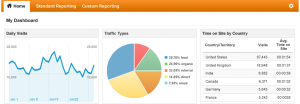Search Engine Optimization

Hi, I run Lookahead Consulting in Seattle. Follow me @reifman or email me.
Search Engine Optimization (SEO) is the practice of ensuring that your web site content is easily indexable by Google, Bing et al. and that it’s using the most popular, relevant keywords that people search for. If you’re unfamiliar with SEO, check out the free introductory guide by SEOMoz.
The Yoast SEO plugin or All in One SEO plugin are good solutions to help you manage SEO with WordPress.
Providing SiteMaps
It’s important that the content management system you use generates a SiteMap, essentially an industry standard index file to your web site contents. Most content management systems either do this or offer plugins to do this. You can use the Yoast SEO plugin to generate sitemaps or the Better WordPress Google Sitemaps plug-in. With the Yoast plugin, I had to re-save my Settings->Permalinks before the site map worked properly.
Register Your Content
You can also register your site with Google and Microsoft to verify that you own them and gain access to deeper search engine activity around your content. I strongly suggest registering for Google Webmaster Tools and Bing Webmaster Tools.
Google and Bing will require that you verifying ownership of your site by placing content on the site, or more efficiently changing the DNS records to search for a specific code.
Optimizing Your Metadata
It’s also important that your content is optimized for search engines to index. There are a number of tools that can help you asses how well you’re doing. This help page from Google discusses which tags are important for you to configure. Generally, you can do this through your content management system but sometimes you’ll need to add a specialized plug-in.
Optimizing for Facebook’s Open Graph
There are also plug-ins for most content management systems to enhance your site’s support for Facebook’s Open Graph protocol, which is also essentially a search engine such as the ones listed here. The Yoast SEO plugin manages open graph tags as well. These plug-ins can also help tag the right image to appear as a thumbnail when people share your content on Facebook.
Web developer Darin Reid recommends sticking to Google’s guidelines for coding your site: “Don’t get suckered by someone practicing bad SEO.” Sometimes it’s useful to see what the Google searchbot sees, you can use Google Fetch to show you a googlebot representation of your site.
Statistical Tracking and Analysis
 It’s important to track the activity of visitors on your website so you can assess whether you’re doing a good job at reaching the people you want to reach.
It’s important to track the activity of visitors on your website so you can assess whether you’re doing a good job at reaching the people you want to reach.
The most popular, free analytics tracking service is Google Analytics.
I also like StatCounter because it provides me a momentary snapshot of my site and allows me to drill down on specific IP addresses as well. e.g. I can see when someone at Microsoft’s PR firm is reading my article on the company’s tax dodge.